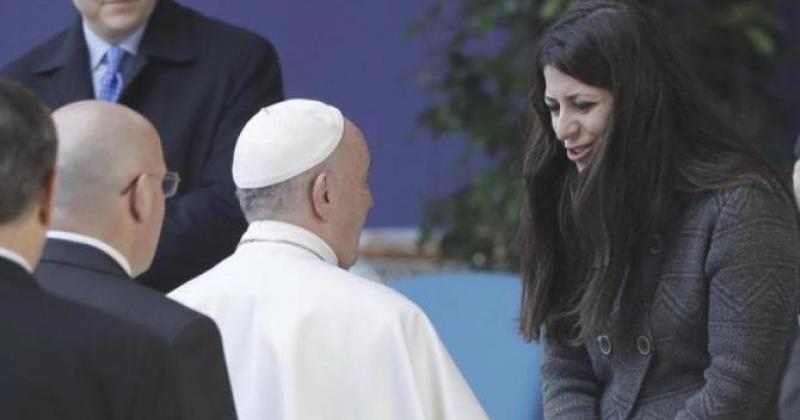“Hey Francis! Le’s take a selfie!” Pope Francis was enthusiastically welcomed by students and professors during this morning’s visit to University Roma Tre, the third and most recent state-run university in Rome. Leaving aside his written speech, the Argentine pontiff responded to four questions asked by four different students, including Nour Essa, Syrian refugee who came to Rome from Lesbos boarding the papal plane on its way back from back from the Greek island in ’April 2016. Migrations, said Jorge Mario Bergoglio responding to Nour Essa’s question, are not a danger for Europe but a challenge to grow. He then continued: Unemployment can lead to suicide; this is why we must oppose with “concreteness” the “liquid economy”. The third world war in which we are immersed, the Pope said, springs from the absence of listening, the violent language of politics, and the lack of dialogue. Universities are called to promote dialogue between differences.
To another student’s question “which is the ’medicine’ necessary to tackle violence?” the Pope answered “The tone of language has risen so much,” Today, insulting each other at home or in the street is normal. Violence is also in our speech. This reality is under everyone’s eyes. No one today can deny that we are at war. It is fragmented – said the Pope – but it is a third world war. We must lower down a bit ’our tone. We must speak less and listen more. Listen carefully, and think before you answer! Heart is the medicine. Before arguing, dialogue! If you think differently from me, let’s dialogue. Dialogue brings people and hearts closer. Dialogue leads to friendship.
We need patience of dialogue. And where there is no dialogue there is violence. War begins in your heart, in our hearts. When I am not able to open up to others, to respect others, to speak with others, to dialogue with others, then war begins. The lack of dialogue is the seed, it is the beginning of the war and the university – Francis - is “the place where we can dialogue”
In this regard, Francis criticized, amidst the crowd’s applause, those ’ideological’ universities, present for example in Latin America, “where they teach you only one ideological line of thought, and prepare you to become an agent of this ideology. It is not a university where there is no dialogue, no comparison, no respect for each other’s thinking, where there is no friendship, no sport, there is no university.”
“There is speed in communication,” Francis said in response to another question. “It ’important to get used to this communication without its rapidity taking away my freedom to say no.” The Pope then widened the speech to the whole society, pointing out that, in the words of the sociologist Zygmunt Baumann, we live in a liquid society. “The liquid economy creates unemployment,” he said, “I will ask a question: dear mother Europe how is it possible that developed countries have such strong youth unemployment rates? Depending on the country from 47%, 50% to almost 60% of 25 years olds and under are jobless. This “liquid” economy is stripping “work” of its concreteness because young people cannot work, young people do not know what to do - he said while the crowd applauded - and I, without a job, because I cannot find one, where am I going? To addictions or…suicide. I am not sure – continued Francis – whether the real statistics of youth suicides are published. This lack of work leads one to enroll into a terrorist army, so to have something to do and give meaning life and this is horrible. Is this is a market economy? I do not know technically, I would say liquid economy. Yet it must be concrete. We need concreteness to solve cultural and economic problems”.
Finally Syrian refugee Nour Essa asked a question on “European fear towards those coming from Syria or Iraq,” In your opinion, are these people threatening Europe’s Christian culture?”. “But - responded Francis - I wonder how many invasions has Europe had? Europe is made of invasions and i mmigrations - has marked Bergoglio - are not a danger, they are a challenge to grow. I myself come from a country where 80% are immigrants. For Francis, “we must give thought to the migration issue today; these people are fleeing war or famine. The ideal solution would be that there is no war and hunger, that is, to make peace or make investments in those places so they have resources to live there. In some countries there is a culture of exploitation. But we go there to exploit them. Do not take advantage. They are hungry because they do not work and do not work because they have been exploited, they run away to get to Europe where they think they will find a better status but end up exploited there as well.
How should we welcome migrants? First - responded the Pope - as brothers and sisters they are men and women like us. Second, each country must see what number it can accept. It is true that there cannot be a welcome if there is not the possibility. However, everyone can do it. Not only welcome but also integrate. I recall the experience I had when Nour Essa arrived: I believe that after three days, the children went to school and spoke Italian, the adults more or less, but the children learned quickly and the majority had jobs and a person accompanying them in the integration process. Open doors. Immigrants can enrich our culture. But they also must receive our culture, and make an exchange of cultures. Respect takes away the fear. “And when there is the will to welcome, accompany, there is no danger with immigration, you receive a culture and you offer another culture, this is my response to fear. “The university, he concluded, “is dialogue among differences.”
